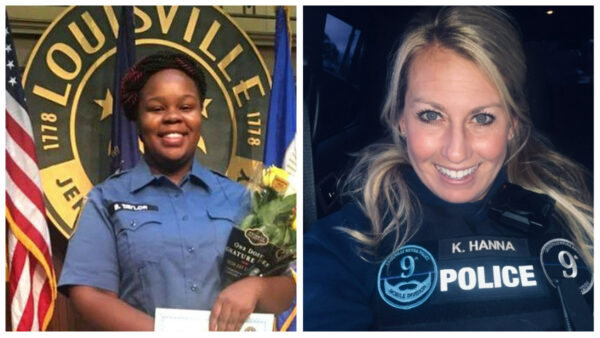Newly surfaced court documents show Louisville Metro police went with their “gut feeling” when they decided to fabricate evidence to obtain a warrant to enter Breonna Taylor‘s home that led to her death.
According to a plea deal signed by LMPD Detective Kelly Goodlett, she and her former partner Detective Joshua Jaynes believed Taylor’s ex-boyfriend, Jamarcus Glover, who they were investigating, was delivering packages with drugs or drug money to her home. When they realized there wasn’t any proof, Jaynes decided to manufacture evidence to support their intuitions.

“The detectives, knowing that they needed actual evidence, rather than just a gut feeling, to get a warrant, attempted to find evidence supporting this gut belief,” the plea agreement says.
Taylor was struck by police gunfire when a team of plainclothes officers entered her apartment in the early morning on the “no knock” warrant. Her boyfriend, Kenneth Walker, mistook the officers for intruders and initiated the shooting. The 26-year-old woman was shot six times, reports show.
Glover and Taylor had an off-and-on relationship for several years, according to her family. Police started surveilling him in January 2020, and they reportedly saw Glover leaving Taylor’s home with a package. Glover was already in custody when the deadly warrant was executed. Glover said the last time Taylor spoke to him was on Valentine’s Day. She was dating Walker at the time of the raid, on March 13, 2020.
Glover denied ever sending anything illegal to Taylor’s apartment and told authorities that he used it for online shopping. Goodlett said her partner asked another officer with contacts at the U.S. Postal Inspection Service to find out if Taylor had been receiving suspicious packages. The other officer told Jaynes there was “nothing there,” court documents show.
Still, Jaynes decided to file a request for the warrant that included a fake authentication from the postal inspector showing that Glover was getting packages delivered to the woman’s home.
“Det. Jaynes was the primary drafter of the Springfield Drive warrant affidavit, but Det. Goodlett fact-checked the affidavit and added some information to it,” the plea agreement says.
Goodlett, Jaynes, former Detective Brett Hankison and officer Kyle Mean were charged with various federal civil rights offenses in Taylor’s death, including unlawful conspiracies, unconstitutional use of force and obstruction, the U.S. Department of Justice announced on Aug. 4.
Steve Cohen, a former prosecutor with the U.S. Attorney’s Office for the Southern District of New York, told Time Magazine that officers tend to band together even if one is guilty of wrongdoing.
“For so many reasons and for so many years, it has always been difficult to obtain the cooperation of a law enforcement officer,” Cohen said. “There is so much pressure on you as a law enforcement officer to stand by your brothers and sisters. The notion of violating that relationship, even to vindicate a broader principle, becomes very difficult.”
Goodlett could face up to five years in prison, a $250,000 fine and three years of supervised probation. Admitting to the scheme has also led her to be a subject of a civil suit.
Two of Taylor’s neighbors who filed a lawsuit against Hankison and others on the scene for “blindly” firing shots into their apartments said Goodlett’s plea deal supports their claims. Chelsey Napper and Cody Etherton live next to Taylor in the building. Hankison is accused of shooting through Taylor’s window and sliding glass door. Some of his shots reportedly went into an adjacent apartment where three people were present.
Napper and Etherton filed the claim against Goodlett on Sept. 14.
“Based on deliberate falsehoods in the completion by Goodlett of an application for the search warrant and an affidavit in support of the search warrant and misrepresentation of facts supporting probable cause, the warrant was unlawful,” the lawsuit states. “Other LMPD Officers should never have executed that warrant.
As a result of their unlawful raid, Ms. Taylor died and the plaintiffs suffered physical and emotional injury and legal injury in the form of lost constitutional rights and property damage.”


